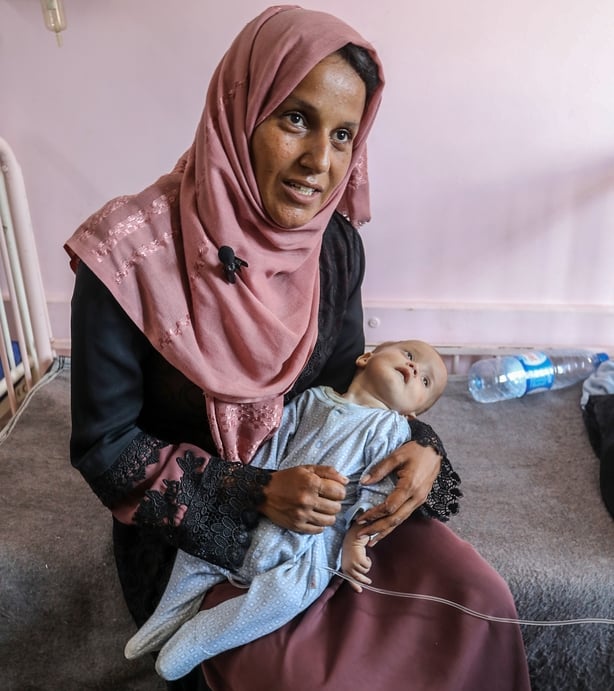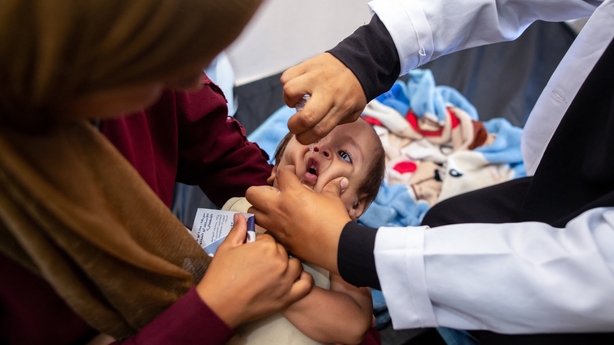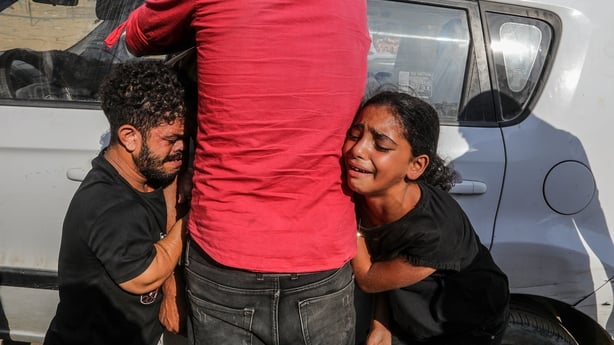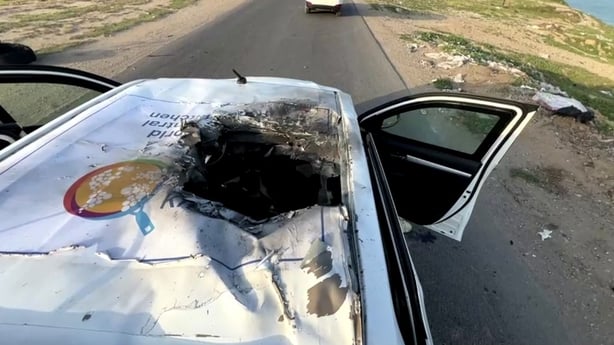Israeli strikes have killed at least 48 people in Gaza today, Palestinian health authorities said, as clashes took place in central and southern areas of the enclave ahead of the planned start of a polio vaccination campaign.
The United Nations is due to start vaccinating some 640,000 children in the territory against polio, relying on daily eight-hour pauses in fighting between Israeli forces and Hamas militants in specific areas of the besieged enclave.
Yousef Abu Al-Reesh, Gaza's deputy minister of health, said vaccination teams would try to get to as many areas as possible to ensure wide coverage but he said only a comprehensive ceasefire could guarantee enough children are reached.
"If the international community truly wants this campaign to succeed, it should call for a ceasefire, knowing that this virus does not stop, and can reach anywhere," he told reporters at Nasser Hospital in the southern city of Khan Younis.
Medics administered vaccines on some of the children at Nasser Hospital wards today in a symbolic move before the official campaign begins.

The campaign follows confirmation last week that a baby was partially paralysed by the type 2 polio virus, the first such case in the territory in 25 years.
WHO officials say at least 90% of the children need to be vaccinated twice with four weeks between doses for the campaign to succeed, but it faces huge challenges in Gaza, which has been largely destroyed by nearly 11 months of war.

As more than 2,000 medical and community workers prepared for the start of the campaign, medics in Nuseirat, one of Gaza's eight historic refugee camps, said separate Israeli strikes killed at least 19 people, including nine members of the same family.

More than 30 other people were killed in a series of strikes in other areas of Gaza, medics said.
Residents and militant sources said fighters from Hamas, the Islamic Jihad, and other groups fought against Israeli forces in the northern Gaza Zeitoun neighborhood, where tanks have been operating for days, and in Rafah, near the border with Egypt.
The Israeli military said in a statement it continued to operate in central and southern Gaza. It said troop skilled militants and dismantled military infrastructure in Gaza City, while they located weapons and killed gunmen in Tel Al-Sultan in western Rafah.
In Khan Younis, in southern Gaza, families returned to their areas after the army ended a 22-day offensive it said was aimed at preventing Hamas from regrouping. Footage showed large areas were flattened, and buildings and infrastructure were destroyed.
Medics said they recovered at least nine bodies from the area where the army operated.
The latest episode in the decades-old Israeli-Palestinian conflict was triggered on 7 October when Hamas fighters attacked Israel, killing 1,200 and taking about 250 hostages, according to Israeli tallies.
Israel's subsequent assault on the Hamas-governed enclave has since killed more than 40,600 Palestinians, according to the local health ministry. Nearly the entire Gaza population of 2.3 million has been displaced and the enclave has a hunger crisis. Israel faces genocide allegations at the World Court that it denies.
We need your consent to load this rte-player contentWe use rte-player to manage extra content that can set cookies on your device and collect data about your activity. Please review their details and accept them to load the content.Manage Preferences
In the occupied West Bank, Israel forces pushed on with a military operation in the city of Jenin. Drones and helicopters circled overhead while the sound of sporadic firing could be heard in the city.
Meanwhile, an Israeli air strike on an aid convoy carrying food and fuel to a Gaza hospital killed four Palestinians on Thursday, US-based aid group Anera said as Israel claimed they were "armed assailants", which the group denied.
The four Palestinians were in the lead vehicle of an Anera aid convoy bound for the Emirati Red Crescent Hospital in Rafah in southern Gaza, the aid group said in a statement.
Soon after the convoy left the Israel-controlled Kerem Shalom crossing into Gaza, four Palestinians from the community "took control of the leading vehicle, citing concern that the route was unsafe and at risk of being looted," Anera said.
"Israeli authorities allege that the lead car was carrying numerous weapons. Every initial report from those at the scene indicate that no weapons were present," the organisation said.
A plan agreed with Israeli authorities called for unarmed security guards in the convoy. The four had not been vetted nor co-ordinated with Israeli authorities, but the convoy did not perceive them as a threat, Anera said.
Anera said there was no warning or communication before the Israeli airstrike.
No Anera staff were injured. After the four were killed, the rest of the convoy delivered the aid, it said.

In a statement quoted by multiple media outlets, the Israeli Defence Forces said: "A number of armed assailants seized control of the vehicle in the front of the convoy... and began to lead it."
"After the takeover and further verification that a precise strike on the armed assailants' vehicle could be carried out, a strike was conducted," the IDF said.
The Israeli military and the Israeli embassy in Washington could not immediately be reached for further comment.
Aid and humanitarian organisations have been hit previously in Israel's Gaza war.
In April, three Israeli strikes hit a convoy of aid vehicles, killing seven World Central Kitchen staff.
The United Nations World Food Programme said this week that one of its vehicles was hit by 10 bullets near an Israeli military checkpoint.
The latest bloodshed in the decades-old Israeli-Palestinian conflict was triggered on 7 October when Palestinian Islamist group Hamas attacked Israel, killing 1,200 and taking about 250 hostages, according to Israeli tallies.
Israel's subsequent assault on the Hamas-governed enclave has since killed over 40,000 Palestinians, according to the local health ministry. Nearly the entire Gaza population of 2.3 million has been displaced and the enclave has a hunger crisis. Israel faces genocide allegations at the World Court that it denies.

